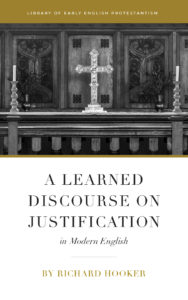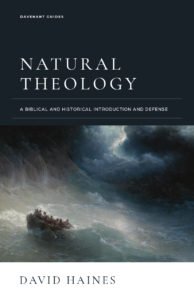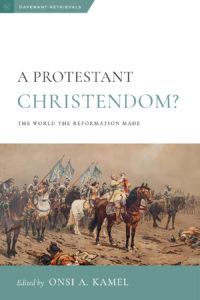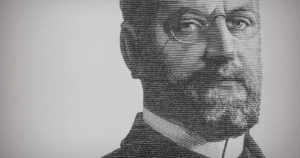
Author’s Corner
Each week on Credo we welcome you to join us in the Author’s Corner where we will meet a set of authors whose recent books deserve your attention and might even help you grow in your knowledge of theology, history, philosophy, and the scriptures. We hope the Author’s Corner can keep you up-to-date on the most important books published today and where you can find them.
On today’s Author’s Corner we present you with a selection of works from the Davenant Institute.
A Learned Discourse on Justification in Modern English (2022) by Richard Hooker
Learned Discourse on Justification in Modern English (2022) by Richard Hooker
The defining doctrine of Protestantism is justification by faith alone–what Martin Luther called “the article by which the church stands or falls.” But does this mean that it is also the article by which salvation stands or falls? Are Roman Catholics heretics for rejecting that doctrine?
In this classic treatise, the great English theologian Richard Hooker tackles this question head-on, seeking to head off two opposite errors: insisting so rigidly on a right articulation of the doctrine that we neglect Christ himself, or minimizing differences over justification as unimportant. In the process, Hooker also offers an excellent blueprint for how to interpret and navigate doctrinal disagreement within the church on any issue.
Centuries on, this remains one of the classic statements of Reformational soteriology, presenting a clear account of what Protestants do and do not believe about the doctrine of justification, along with a careful summary of what their Catholic opponents held. Readers seeking a helmsman who can faithfully guide them through the fog that so often bedevils this crucial conversation need look no further.
N atural Theology: A Biblical and Historical Introduction and Defense (2021) by David Haines
atural Theology: A Biblical and Historical Introduction and Defense (2021) by David Haines
Christians affirm that Scripture alone reveals truths about God which cannot be known by mere reason, such as the Trinity or the Gospel itself. But how do we account for Scripture’s apparent talk of a knowledge of God possible solely from creation? Or for our own sense of the divine in nature? Or for the startling insights of ancient philosophers about the nature of God? The answer: natural theology.
Often misrepresented as a fruitless human attempt to comprehend God, natural theology has in fact been a significant part of Christian theology throughout history. It has shaped the Christian doctrine of God and provided a starting point for evangelizing non-Christians. In an age when theologians and missionaries alike are in need of stronger doctrinal foundations, it is a doctrine as vital as ever.
In this brief guide, David Haines first outlines the biblical basis for natural theology, suggesting that, if Scripture is correct, certain truths about God should be well attested by non-Christians. A thorough historical survey demonstrates that this is indeed the case, and that the Church has long made use of that which is revealed to reason in order to serve Christ, who is revealed to faith.
A Protestant Christendom? The World the Reformation Made (2021) by Onsi A. Kamel
Protestant Christendom? The World the Reformation Made (2021) by Onsi A. Kamel
Our world is obsessed with stories about Protestantism and modernity.
Are Protestant societies dynamic, progressive, and free? Or are they godless, Erastian, and libertine? Thinkers and theologians once argued we should rejoice in Protestantism’s creation of societies grounded on reason, freedom, and the individual; now, many are quick to pin the blame for modernity’s ills squarely on the Reformation. But these are two sides of the same coin, united by a shared assumption: that Protestantism necessitates revolution, and with it the dissolution of religious and metaphysical bonds which once united generations, nations, a continent, the Church, and even heaven and earth.
But what if these accounts are wrong? What if Protestantism is more than this, or something different altogether? The burden of this book is to illuminate Protestantism’s historic vision of society, culture, and governance, with the aim of applying its rich legacy in our own day. Collecting and expanding essays originally published in the journal “Ad Fontes”, this book deals with the issues of church and state, politics and culture, and economics and justice, and proposes that Protestantism’s own vision for these things is worth seeing afresh, on its own terms.
If you are willing to ask “A Protestant Christendom?”, you may be surprised by the answer.

